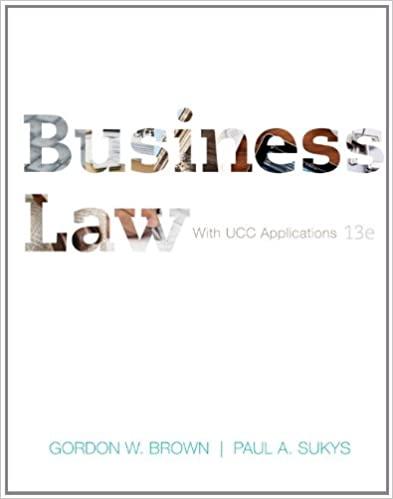In 1985 Josef Kleinfeld purchased a building in the East Village and opened a video rental store
Question:
In 1985 Josef Kleinfeld purchased a building in the East Village and opened a video rental store on the ground floor. Unfortunately, Kleinfeld lost a great deal of money during his first year. Things were so bad that he decided to fire his clerk , a New York University student named Dawn Robinson. Robinson pleaded with Kleinfeld to keep her on as his clerk by promising to give up her hourly wages and instead take a percentage of the store’s profits every two weeks. Kleinfeld would not have to pay her anything if the store made no money during any two-week period. Kleinfeld , who could see that Robinson knew about the video market and was very skillful in handling customers, gave her more and more responsibility in store matters. Eventually, Robinson ran the business. She hired and fired clerks, ordered tapes, set prices, balanced the books, handled payroll, wrote the firm’s policy and procedure manual, and filled out the firm’s tax returns every year. Her business acumen led her to move Kleinfeld’s store away from Beta tapes and into an exclusive VHS business before any other rental store in the neighborhood.
Later, she was quick to see that the DVD market would overtake the VHS market and moved the store into DVDs, again ahead of all local competition, and then into Blu-ray discs. The store expanded until it occupied all three floors of Kleinfeld’s building.
During all of this time, Robinson continued to draw a percentage of the profits, periodically negotiating increases until the percentage reached 45 percent.
Meanwhile, Kleinfeld did little more than check on Robinson’s progress every two weeks—and sometimes not even then. Her work at the store enabled him to use his own profits to engage in other ventures. While working on one of these ventures, Kleinfeld met Gerry Ackerman, who offered to purchase Kleinfeld’s business and his building for $50 million. Kleinfeld agreed. When Robinson was told about the deal, she expected to get a share of the sale price, based on her percentage of the profits. Kleinfeld was offended by Robinson’s demand and refused to comply. Robinson sued Kleinfeld, claiming that she had been a partner in the video business in everything but name. She ran the business; she contributed her expertise in technology, customer relations, and business matters to the running of the store; and for 20 years she had taken only a fair share of the profits for pay.
As you read the chapter see if you can figure out how the judge ruled in this case.
Question
1. What is the definition of a partnership?
2. What is the most crucial factor in the creation of a partnership?
3. What additional factor helped create a partnership in this case?
4. How can problems like the ones that occurred in this case be avoided?
5. What statute usually covers general partnership matters in most states?
Step by Step Answer:

Business Law With UCC Applications
ISBN: 9780073524955
13th Edition
Authors: Gordon Brown, Paul Sukys




